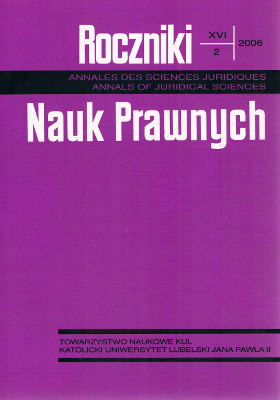Podmiotowość prawna gminy w Polsce w świetle Europejskiej Karty Samorządu Lokalnego
Fundamental Issues Concerning the Legal Subjectivity of a Commune in Poland Fram the European Charter of Local Self-Government Paint of View
Author(s): Małgorzata Kruszewska-GagośSubject(s): Politics / Political Sciences, Law, Constitution, Jurisprudence, Public Administration, EU-Legislation
Published by: Towarzystwo Naukowe KUL & Katolicki Uniwersytet Lubelski Jana Pawła II
Keywords: the public legal subjectivity of a commune; Local self-government; European Charter of Local Self-government; Local Self-government Commune Act; Public authority; Public rights
Summary/Abstract: Local self-government is one of the fundamental institutions of a modern democratic law-governed state. In the Polish Constitution, enacted on 2 April 1997, the underlying principle of local government and decentralization of public authority was given the status of the chief systemic principle. In Polish law order it is not only demanded that local governments be established and participate in exercising public authority but it is also stipulated how they should operate. Such principles are substantiated by means of ordinary acts of law.In reviving the local self-government the legislator was guided by the concept of public law associations as envisaged by Tadeusz Bigo. Additionally, the resolutions of the European Charter of Local Self-Government were respected. The Charter was ratified by the Republic of Poland by virtue of the government declaration of 14 July 1994.The Charter embodies general principles, common to the democratic countries of Europe, that aim to unify the structure of local self-government in Europe. Its signatory states pledged to cooperate in solving local problems along democratic lines with regard to their national heritage. The Charter attempts to reconcile unification tendencies with those attributes of self-governments that derive from cultural diversity and identity of individual nations. Hence its provisions are of a general nature in order not to destroy the unique heritage of individual countries with regard to self-governance.The substance of the European Charter of Local Self-Government implies that building Europe on the basis of democratic and decentralization principles requires that local self-governments be consolidated since the civic right to participate in the handling of public matters is one of the core principles that are common to all those states belonging to the Council of Europe. This is possible if local communities have their own decision-making bodies and these are appointed democratically, enjoying a great deal of autonomy in terms of the mode of execution of their powers and the means essential in the realization of their tasks.The Charter defines self-government as law and capacity of local communities to manage the majority of public matters on their own account and on behalf of the local residents within the limits of law by councils and assemblies that are composed of members elected in free, direct and universal elections conducted by secret ballot. This, however, does not preclude the possibility of making use of such democratic tools as assemblies, referendums or any other form of direct participation of citizens if the law provides for it. The Charter regulations are respected and included in the Constitution and the Local Self-Government Commune Act.The subject of the Polish communal self-government is the communal corporation which appoints by way of election the bodies that perform tasks imposed on it. According to the European Charter of Local Self-Government, the commune must be founded upon the subjective rights of the individuals inhabiting its territory; it is also to fulfil their right to association and participating in local authority. In exercising public administration the commune should represent the subjective rigthts of a community, which are based on subjective rights of its members. The expression of its subjectivity is the fact that the commune is granted the status of a legal person and guaranteed a judicial protection of its autonomy. It represents the subjective laws of individuals before state authority. The Charter's provisions are fulfilled by Polish legislation. This is evidenced by the fact that the principles of local self-government and fundamental competences of communal corporations are stipulated by the Constitution and laws. Supervision is performed only in terms of legality.
Journal: Roczniki Nauk Prawnych
- Issue Year: 16/2006
- Issue No: 2
- Page Range: 367-392
- Page Count: 26
- Language: Polish

